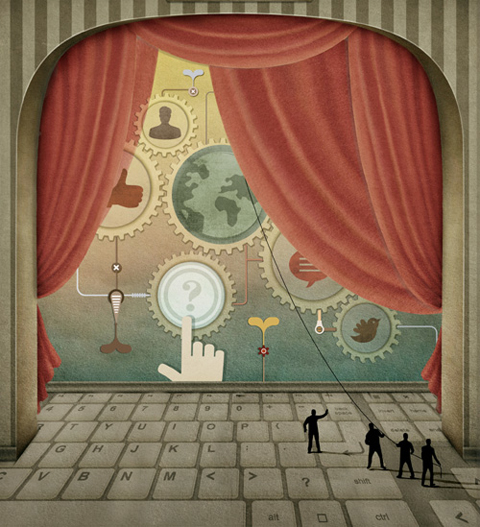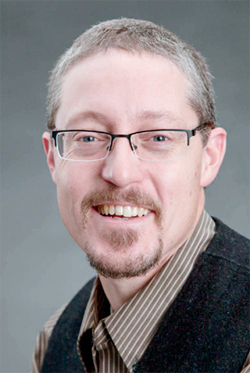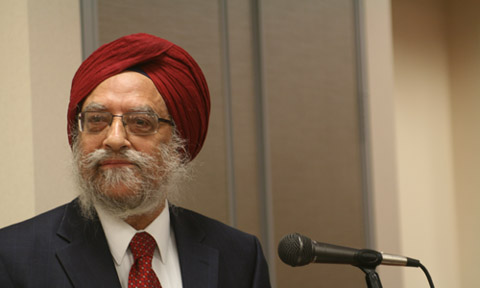By Corinne Colbert
When one thinks “social network,” it’s easy to envision Facebook posts or LinkedIn connections. When Dr. Ted Welser thinks “social network,” he sees the Industrial Revolution.
Welser, Assistant Professor of Sociology, specializes in studying how people represent themselves and relate to others on the internet. He compares today’s social media environment to the beginnings of sociology as an academic discipline.
“Sociology was born from the transition from rural areas to the metropolis,” he says. Early sociologists were interested in how that move would change people’s roles, particularly in the workplace.
Roles are changing again today, Welser says, as we create increasingly complex relationships in cyberspace. Six years after earning his doctorate in sociology at the University of Washington, Welser has created a significant body of research, particularly about the kinds of roles people play in collaborative online spaces.
“Ted has done some of the early, foundational work in understanding how online communities and social media operate in a modern context,” says Cliff Lampe, assistant professor in the School of Information at the University of Michigan. “This work has tremendous scholarly and practical importance, as these principles affect how we understand the ways in which different people use social media in a variety of ways.”
All the (Online) World’s a Stage
On the bulletin board across from Welser’s office in Bentley Annex is a huge poster bearing three network graphs; they look like varying formations of a child’s pick-up sticks. Each image is a visual representation of interactions on Usenet, an online forum popular in the 1990s. Like a bulletin board, Usenet allowed anyone to post a thought or a question for others to reply to with comments or answers.
Welser points to one image with hundreds of lines radiating out from a central point. “All this (type of) person did was answer people’s questions,” he says.
Answer People rarely posted questions or comments of their own, so all of their interactions were outward—hence the central point (the Answer Person) and the spikes (the people posting questions).
Answerers could have any of several motivations: a desire to show off to the less experienced, a sincere wish to help, or the hope of being recognized as an expert by others. Whatever the motivation, the Answerer represents a specific role that applies in multiple collaborative forums, Welser has found.
Welser did the research behind the poster as a doctoral student, while interning with a Microsoft Research group led by Marc Smith, then the software giant’s in-house sociologist. Smith’s work at Microsoft led to the creation of NodeXL, an open-source tool for mapping social networks, and pioneered technologies that now appear in apps for Apple, Facebook, and Google. Welser was intrigued by Smith’s application of sociology to technology—so much so that he has dedicated his professional career to it.
Since publishing the results of their first Usenet study in 2005, Welser and Smith have collaborated on more than two dozen projects, including journal articles, conference presentations, and book chapters. Smith, now the head of the Social Media Research Foundation, says his protégé has made him proud.
“Ted has been a pioneer in applying social science, social network analysis, and social media to address questions about how groups succeed or fail to generate collective goods and outcomes they desire,” Smith says.
Six Degrees of Ted Welser
To Welser and his colleagues, online social networks aren’t just places to post pictures of your kids, your cat, or your dinner. “The internet is not a fad—it’s a social space,” he says.
And it’s as legitimate a space as a bar or an office, he says. Rather than killing personal interaction, Welser says online social networks are building a digital metropolis where we can forge relationships based on common interests. Far from being superficial, these relationships can be just as strong and meaningful as those in the real world.
“Even if it’s just an emoticon (in an e-mail), we still feel real emotions,” he says. “In some ways, it’s a really wonderful thing.”
Everyone who has a social media presence has a web of connections—immediate and extended family, high school and college friends, co-workers and professional colleagues. Some of them may be people you wouldn’t stay in touch with without e-mail or Facebook. Some of them may be people you met through a common social media connection, linked only by a shared interest in cake decorating or pugs.
That’s one of social networks’ greatest powers: the ability to facilitate relationships in circumstances that might not be palatable or possible in the real world.
“In online social networks, we can have relationships with people who we wouldn’t have relationships with if we were restricted to using the phone or talking face to face,” Welser says. “At the same time, it brings us into contact with people we wouldn’t otherwise meet. We can transcend the accident of geography.”
Stop, Collaborate, and Listen
So what happens when those diverse populations meet—say on a newsgroup? Just as happens in a classroom, an office or a sports team, people online fall into particular roles in their interactions. On Usenet, those were Answer People, Questioners, Trolls (troublemakers), Spammers, Flame Warriors (the argumentative), and Conversationalists (social butterflies). On Wikipedia, they are Substantive Experts, Technical Editors, Social Networkers, and Counter Vandalism. All are defined by what they do in the collaborative space.
The Industrial Revolution saw a “de-skilling” of labor, as work shifted from craftspeople who could do many things to assembly lines where workers did a single, narrow, repetitive task. On collaborative internet sites, Welser says we’re seeing a return to the generalist who contributes in many ways.
“In systems like Wikipedia we do see some specialization—some editors revert vandalism, others fix grammar—but many choose to contribute in a variety of ways on a variety of subjects,” he says. “The technology of the wiki combined with the social expectations of the community allow for more skillful producers.”
This could matter very much if you’re the manager of a social networking site and need to boost participation. Understanding your market is the most important step in any marketing campaign. It could also matter if you’re an organizational consultant—or a counterterrorism expert—trying to identify potential leaders in an organization by perusing an internal wiki or public social media.
Or, if you’re a random Wikipedia editor, you might just get a kick out of knowing your type.
This story appears in the Spring/Summer 2013 issue of Perspectives magazine, which covers Ohio University research, scholarship and creative activity.





















Comments